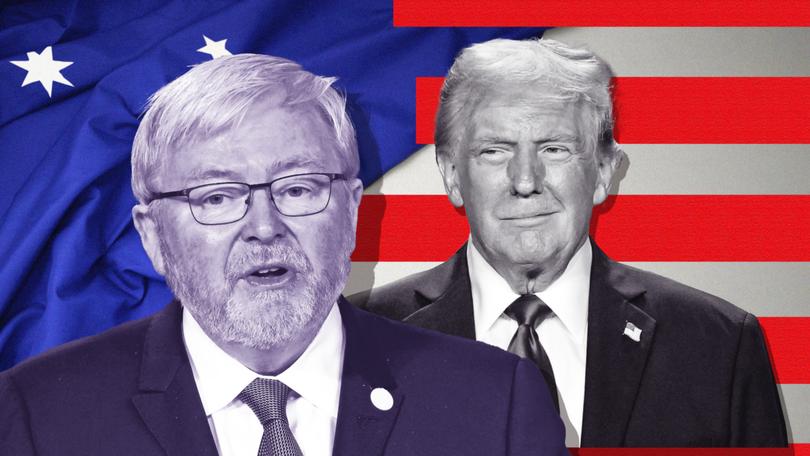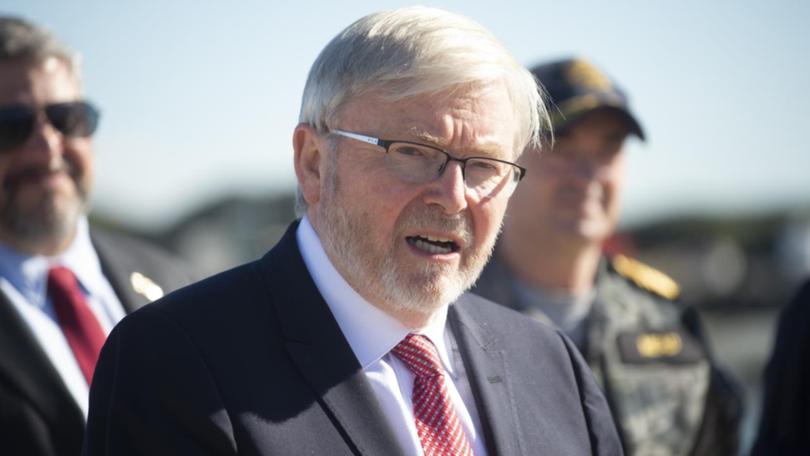KATINA CURTIS: Is Kevin Rudd capable of putting his country above self-interest?
KATINA CURTIS: Anthony Albanese is getting lots of free advice on handling Trump and the MAGA-Republican administration; there’s a proven approach he can follow.

Anthony Albanese has received plenty of free advice on dealing with Donald Trump and the incoming MAGA-Republican administration.
The Prime Minister might not need to look far for an approach that works.
How does this sound? Co-operate where we can disagree where we must, and always work in Australia’s national interest.
Sign up to The Nightly's newsletters.
Get the first look at the digital newspaper, curated daily stories and breaking headlines delivered to your inbox.
By continuing you agree to our Terms and Privacy Policy.If it rings a bell, that’s because it’s the mantra the Government landed on for its approach to China over the past two years.
Albanese and his ministers have repeated it ad nauseam in response to almost every question about the Asian superpower as they worked to restore equilibrium to the relationship.
Arguably, the formula articulates Australia’s diplomatic approach to any country with which we are nominally friendly.
But given that specific wording has now been closely linked to stabilising Australia-China relations don’t hold your breath for it to be adopted by the Trump-led US.
But it may well be adapted.
Many Australians found the “Centenary of Mateship” campaign, with its twinned eagle-kangaroo logo and the totemic tale of Leslie “Bull” Allen’s daring exploits saving Americans, nauseating and ridiculous.
However, it wasn’t aimed at them — and it worked on the Trump 1.0 administration’s ears for which it was designed.
Expect to hear a renewed emphasis of the long friendship between Australia and the US, one that has withstood the decades and changes in governments on both sides of the Pacific.
“That will last until there’s a big blow-up,” is the assessment from US Studies Centre foreign policy director Peter Dean.
Then, he believes, there will be much more emphasis on how friends can agree to disagree on certain areas.
For all the attention on the closeness of the alliance, it is also true there have been many disagreements over the years.
In the Bush White House, it was lore that you didn’t talk about sugar or beef when the Australians were in town because of long-running trade disputes in those areas.
Tensions eased once John Howard finally landed the US-Australia free trade agreement, but with universal tariffs high on the Trump agenda, trade may regain its hot-button status.
AUKUS is also causing anxiety for Australia.
Over the past few months, for every Trump whisperer saying the submarine deal would be secure, there seemed to be another insider warning the Republicans would dump it.
Few in Australian defence and government circles want to see the AUK scenario leap from the latest season of The Diplomat into reality.
Trump’s indication he wants to appoint Marco Rubio as Secretary of State is a good sign; he falls into the first category of Trump whisperer.
The pick of Iraq and Afghanistan veteran turned Fox News presenter Pete Hegseth for the Defence role is more left-field, and people will scramble to work out what he thinks — or can be persuaded — on these key questions.
The “people” doing that scrambling are led at the moment by Kevin Rudd.
At the moment.
The resurfacing of Rudd’s past comments about Trump and his post-election announcement he was deleting them so they wouldn’t prove a distraction has been, well, very distracting for the push to make sure Australia has strong enough links with the incoming team.

It is worth recalling shadow foreign affairs minister Simon Birmingham’s veiled warning when Rudd was appointed: “Prime Minister Albanese has personally chosen a friend and confidante, a former parliamentary and ministerial colleague, and someone in whom Mr Albanese clearly has faith and confidence.”
In other words, if it all goes pear-shaped, this is on Albanese and Albanese alone.
Whether Rudd’s past insults have a lasting effect on the mercurial Trump remains to be seen.
Everyone in Australia is backing Canberra’s man in Washington — for now.
Rudd has formed good relationships with Republicans and Democrats in Congress and across Washington, and the Government repeatedly points to the bipartisan backing for last year’s AUKUS-related legislation.
But if Trump dislikes Rudd, it’s likely those contacts on Capitol Hill will wither.
In that case, the Government would be in a bind.
Sacking Rudd would look like capitulating, but keeping him on would be detrimental.
Canberra would be praying in this scenario that Rudd would follow the example of UK ambassador Kim Darroch back in 2019.
Leaked cables revealed his assessment of an “inept” and “dysfunctional” White House. Trump tweeted that nobody liked Darroch anyway, and within days, he was headed home after resigning because he felt it was untenable for him to stay in the role.
Would Rudd do this if his ties soured? Or would he think he was bigger than the US-Australia relationship?
Let’s hope if he found cooperation was flailing and disagreements strayed beyond where they must, he would act in the national interest and walk.

